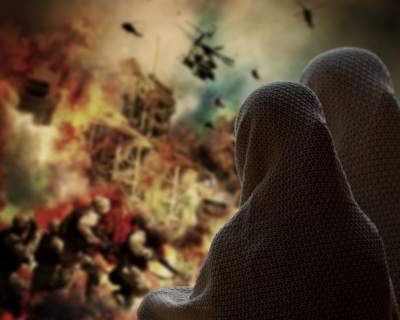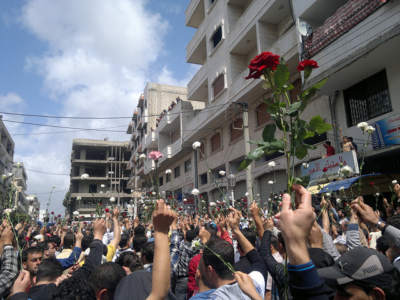When trying to make sense of the suffering and violence taking place in Aleppo and Syria at large, I have recently turned to Jewish prayers to provide me with the necessary structure to process the tragedy and aid those who are suffering.
“But why?” I wondered pensively as I carelessly hummed the amidah, the silent devotion, to and from school. It wasn’t until I became aware of tragedy and disaster in the world that I started to search for tools to help me make sense of the world’s pain. It was then that I began to lean on the ancient words of Jewish prayers to help guide me – both in thought and in service – to those who are suffering in my local and international communities. There is no sense in the violence wrought against Syrians. However, our Jewish prayers can help guide us in our attempts to understand and aid those who are suffering.
“Shema yisrael.”
Our deepest meditation as the Jewish people is the Shema. “Listen,” our religious school teachers, our parents, and our ancient sages instruct us. To hear one another is a simple command, but one that I often forget. Divisive rhetoric from Donald Trump and other xenophobes have attempted to make the American public deaf to the cries and the stories of those attacked in Aleppo. So many people plugged their ears with bigoted stereotypes when Syrian refugees shouted at the world to hear them and listen to their stories. Many in America and around the world chose to ignore the screams of Syrians escaping disaster.
But, as Jews, we are instructed to remember the Shema, to remember to listen when we wake up and when we go to sleep. We are reminded to bind the words of the prayer on our arms and our foreheads and to affix the commandment on our doorposts. In doing so, our homes, our bodies, and our tongues become constant reminders that we must hear one another and listen to the stories of our friends, neighbors, and far away brothers and sisters as we move through the madness of this world.
The prayer continues that only if we listen can we find, “Hashem Elokeinu, our G-d.” Thus we must not hold those crying out in Syria at arms length. For if we listen to their stories and hear their cries, we will find that they are made in the image of the G-d who created us. If we truly listen to those in Syria, we might realize that, Hashem echad, “G-d is one,” and thus, we are all one. The xenophobic fracturing and othering pushed by our politicians is not holy. To hear the stories coming from Aleppo is our duty as Jewish people.
We end all of our tefilot with a prayer for peace. These final meditations on peace remind us that the intention of our long, heart-felt moments of prayer is to orient ourselves towards creating justice and restoring wholeness, shalom, to the world. The news coming from Syria these past weeks puts urgency on our thoughtful and active movements towards peace.
As rebel forces in Syria have warred against government forces, the ancient city of Aleppo and villages throughout Syria have been reduced to ghosts of their former selves. The physical destruction of a land is the slow dismantling of a culture and ultimately a people. How do we restore wholeness to a city shattered to pieces? How do we bring tranquility to families that are being torn apart?
The Reconstructionist prayer for peace above paints an image of what tranquility might look like. In a peaceful land, the earth will no longer be lined with the jagged scars that violence wreaks, “a sword com[ing] upon your land.” Instead there will be streams swelling and gushing with water because in times of peace, “justice shall roll down like the waters.” As the prayer explains, a peaceful time is one in which people have access to life-providing resources and are able to to live from the land that is theirs and their ancestors’. Peace is rebuilding Syria’s destroyed cities and every family’s fallen home. Righteousness and justice, the end of swords being raised against enemies, requires the complete healing of the earth, the cities, and the homes Syria’s wars have destroyed.
As I describe, remember, and write about Aleppo, I know I cannot turn the pain or suffering of that city and its people into just another think piece. The destruction, the suffering, the pain is too much for my cheap attempts at beauty or sense-making to bandage. There is no sense in such madness. All I can do is listen to the stories coming from this hurting city. All we can do is center ourselves around peace, listen to others, and bring comfort and justice to those in Syria, as our prayers constantly teach us.
“Oseh shalom bimromav, hu yaaseh shalom aleiynu, v‘al kol Yisrael, v’al kol yoshvei tevel. V’imru amen.”
“The Spirit who makes peace in the high places,
Shall make peace upon us,
And upon all of Israel,
And upon all the world.
And say Amen.”
Hannah Weintraub is a senior at the University of Pittsburgh, majoring in History and Fiction Writing with a minor in Jewish Studies.
![Syria | [Public Domain], via Pixabay](https://newvoices.org/wp-content/uploads/2017/01/Syria.jpg)


